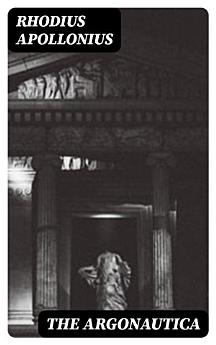The Argonautica
Rhodius Apollonius
মে’ ২০২২ · DigiCat
ইবুক
149
পৃষ্ঠা
family_home
যোগ্য
info
reportমূল্যাংকন আৰু পৰ্যালোচনা সত্যাপন কৰা হোৱা নাই অধিক জানক
এই ইবুকখনৰ বিষয়ে
In 'The Argonautica', Rhodius Apollonius reinterprets the myth of Jason and the Argonauts, crafting an epic poem that deftly blends adventure with deep emotional resonance. Written in the Hellenistic period, this work distinguishes itself through its complex characterization and sophisticated narrative style, moving beyond the traditional heroic paradigm of earlier epics. Apollonius employs vivid imagery and intricate symbolism to explore themes of love, ambition, and the struggle against fate, all while maintaining a rich poetic meter that resonates with classical sophistication. The poem challenges conventions, offering a nuanced portrayal of heroism that reveals the vulnerabilities of its characters as they navigate treacherous waters and profound personal dilemmas. Rhodius Apollonius, a contemporary of the great library of Alexandria, was deeply immersed in the literary culture of his time, influenced by both earlier epic traditions and the burgeoning Hellenistic interests in individual psychology and emotional conflict. His engagement with philosophical thought and the exploration of human emotions in the interplay between divine intervention and personal agency informs the depth of his narrative. This backdrop of intellectual inquiry and cultural dynamism significantly shaped his vision in creating 'The Argonautica.' Recommended for scholars and enthusiasts of classical literature alike, 'The Argonautica' offers a rich tapestry of myth and humanity that transcends its narrative scope. Apollonius's epic invites readers to reflect on the interplay between destiny and choice, making it a timeless addition to the epic tradition. This work will captivate anyone interested in the evolution of Greek poetry and the intricate depths of its heroic narratives.
লিখকৰ বিষয়ে
Apollonius Rhodius, also known as Rhodius Apollonius, is an ancient Greek poet and scholar, best known for his epic poem 'The Argonautica'. His life dates are not precisely known but scholars posit that he flourished in the 3rd century BCE. His work, 'The Argonautica', is a singular epic that stands out due to its Hellenistic context and its divergence from the Homeric style. Unlike the works of Homer, which celebrate the heroic ethos in a relatively straightforward narrative, Apollonius's poem delves more deeply into the psychological states of its characters, particularly the hero Jason, and his volatile relationship with the sorceress Medea. 'The Argonautica' is notable for its complex narrative structure, sophisticated language, and the use of interior monologue. The poem also offers detailed depictions of divine intervention in the affairs of mortals and subtly discusses the nature of fate and destiny. Apollonius was connected with the famous Library of Alexandria and is believed to have served as its head librarian at one point, indicating his prominent scholarly stature. His work has contributed to the tradition of epic storytelling and has been analyzed for its literary innovations and influence on later authors, such as Virgil and Ovid. 'The Argonautica' remains a pivotal piece of literature, capturing the transformation of Greek culture during the Hellenistic period and the evolution of epic poetry.
এই ইবুকখনক মূল্যাংকন কৰক
আমাক আপোনাৰ মতামত জনাওক।
পঢ়াৰ নির্দেশাৱলী
স্মাৰ্টফ’ন আৰু টেবলেট
Android আৰু iPad/iPhoneৰ বাবে Google Play Books এপটো ইনষ্টল কৰক। ই স্বয়ংক্রিয়ভাৱে আপোনাৰ একাউণ্টৰ সৈতে ছিংক হয় আৰু আপুনি য'তে নাথাকক ত'তেই কোনো অডিঅ'বুক অনলাইন বা অফলাইনত শুনিবলৈ সুবিধা দিয়ে।
লেপটপ আৰু কম্পিউটাৰ
আপুনি কম্পিউটাৰৰ ৱেব ব্রাউজাৰ ব্যৱহাৰ কৰি Google Playত কিনা অডিঅ'বুকসমূহ শুনিব পাৰে।
ই-ৰীডাৰ আৰু অন্য ডিভাইচ
Kobo eReadersৰ দৰে ই-চিয়াঁহীৰ ডিভাইচসমূহত পঢ়িবলৈ, আপুনি এটা ফাইল ডাউনল’ড কৰি সেইটো আপোনাৰ ডিভাইচলৈ স্থানান্তৰণ কৰিব লাগিব। সমৰ্থিত ই-ৰিডাৰলৈ ফাইলটো কেনেকৈ স্থানান্তৰ কৰিব জানিবলৈ সহায় কেন্দ্ৰত থকা সবিশেষ নিৰ্দেশাৱলী চাওক।








